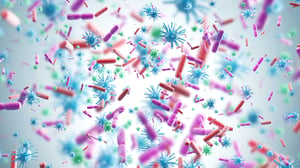A study by Exeter University in the UK has reproposed the idea of using ‘phages’- viruses that are harmless to humans but often lethal for bacteria – instead of antibiotics.
Before the pandemic, health authorities worldwide, including the WHO, had given numerous warnings about what they considered the most dangerous medical crisis of all: increasing antibiotic resistance by a growing number of bacteria harmful to humans (like pneumonia and salmonellosis).
The situation has not improved in recent months. In fact, reports of bacterial strains resistant to most available antibiotics are increasing worldwide.
In order to discover effective new methods, researchers at Exeter University in Great Britain, looked at using phages (special viruses that only affect bacteria) instead of antibiotics, and obtained promising results, published in the scientific journal PLOS Biology.
The idea of using phages to fight the most dangerous bacteria is almost a century old and had been largely abandoned. Now these positive results from Exeter may encourage this line of research once again, if the data is confirmed and further studies are carried out. In the next few years, we may have a whole category of new therapeutic solutions to effectively combat the most stubborn bacterial infections.
So how do phages work? These viruses attack bacteria in a specific way, hence their name: bacteriophages or, more simply, phages. They are often lethal to bacteria, but completely harmless to humans.
As soon as their main features were understood, scientists began to exploit them and the first experimental therapy was carried out as early as 1919, when French microbiologist Felix d'Herelle used them to treat a 12-year-old boy with severe bacterial dysentery. In later years, however, the dawn of antibiotics, which were more manageable and easier to obtain, pushed phage therapy into the background. Today, it may be ready to re-emerge into the spotlight.
Experimental difficulties
One of the main obstacles researchers have encountered in recent years is the large difference between experimental and real-life conditions, i.e. between growing viruses in cultures in a lab to measure their effectiveness (usually in sealed flasks) and the situation in a living organism, where bacteria and phages fight for survival in a microenvironment made up of different types of cells, blood vessels and tissue. In flasks, bacteria are present in almost pure solutions, which is why they can quickly develop resistance even to phages.
To overcome these shortcomings in experiments, the team of British researchers, led by Italian Stefano Pagliara tried a different approach. They reproduced a microenvironment similar to that in the body inside a lung (with capillaries and air sacs) and introduced Escherichia coli bacteria (which often causes food poisoning) together with different types of phages, in order to study the behaviour of these microorganisms in a more detailed and realistic way.
The strategies of bacteria
With this method, the team found that in these microenvironments, Escherichia coli do not become genetically resistant to phages, and most of the bacteria is killed by the phages themselves. Not all, however, responded, and this was because some bacteria try to 'delete' some of the proteins (receptors) on their outer wall. If these molecules are absent, viruses cannot latch on and infect them.
In any case, the study provides a great deal of new information on the behaviour of these bacterial viruses and gives a glimpse of a possible direction for new research. In particular, if we can find a way to increase the presence of receptors on the surface of bacteria, we can render phages effective enough to virtually eradicate all bacteria, without creating any kind of resistance.

